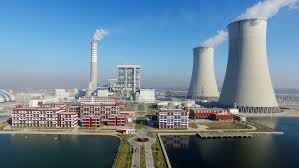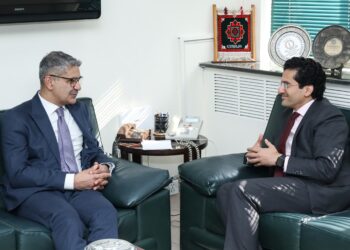ISLAMABAD: Chinese Companies are reportedly in panic on exclusion of $ 4 billion worth two key hydel projects, Azad Pattan and Kohala from ” committed” projects from the Indicative Generation Capacity Expansion Plan (IGECP) 2025-35, Newzshewz has learnt reliabily.
In a letter to Prime Minister, Shehbaz Sharif, Chief Executive Officer (CEO), Azad Pattan Power Company, Wang Xiaoming, has stated that 700.7 MW Azad Pattan Hydropower Project, but the discussion applies equally to the 1,124 MW Kohala HPP for a quick overview and ease of understanding.
Both hydropower projects are priority energy projects under the CPEC framework between the Governments of China and Pakistan and are at an advanced stage of implementation .
The projects will bring in a combined total investment of over Us$ 4 billion which is highly beneficial for Pakistan. International financial institutions have refused to finance projects in the AJ&K and only Chinese banks are willing to consider such financing which is committed for these projects.
Construction of these hydropower projects will go a long way in securing Pakistan’s water rights and give additional security at a time when the Indus Water Treaty (IWT) is under abeyance.
Hydropower projects have a long development period but a very long life circa 100 years, however, they cannot be developed under normal IGCEP processing and require special consideration.
” We want the Prime Minister to intervene and directed that for the sake of policy consistency, continuity and investment in the country the planning process be rationalized to give consideration to the long development cycle for large scale hydropower projects,” he added.
Chinese Company is of the view that inconsistency be removed and the status of these projects be restored as ” committed” under the IGCEP 2025-35( presently under finalization and approval) so that the sponsors can conclude the ongoing financial closing process for these projects of supreme interest.
Hydropower projects have the longest development timeframe of all power projects, due to the complex nature of hydropower development; and worldwide it typically takes 10 to 15 years or even longer, from inception to production. Though in Pakistan, experience has shown, it often takes between 15-20 years or more to conceive, develop, finance, construct and commission hydropower projects.
The Azad Pattan HPP was issued a Letter of Interest (LoI) on 27 April 2007 and has diligently pursued the development process for the past 18 years. Hydropower projects are site specific, and each project has its own engineering civil works design to address the specific conditions at the site. The plant and machinery is also custom designed, engineered and manufactured to suit the conditions at a particular site and unlike other power generating technologies is not modular or off the shelf.
During this period, amongst others, a bankable feasibility study was commissioned carried out by world renowned engineering consultants Scott Wilson UK (now part of AECOM ranked No. 1 by Fortune), seismic, geological and hydrological risks were addressed, project land acquired and inhabitants resettled and re-housed, ICB for the EPC Contractor carried out and approved, NEPRA tariff determination obtained, numerous consents including environmental approvals secured. It goes without saying that over this long development period, Azad Pattan Sponsors have incurred tens of millions of US dollars in pre- construction costs, including land acquisition and resettlement, wholly financed by equity.
However, this long and difficult development period is compensated for by the long service life of hydropower plants which, with major upgrade circa 50 years, has a long life of circa 100 years, as is evident from many working hydropower projects, not only in Pakistan but also worldwide.
The Power Company is of the view that the IGCEP prepared by NTDC “is an indicative development plan and confirmation of any new generation project for future procurement”. The purpose of the Plan is to identify new generation requirements by capacity, fuel, technology and commissioning dates on year-by-year basis. The Plan considers existing capacity, retirement, committed and candidate projects, during the planning horizon.
” To date five iterations of IGCEP have been made public, while the sixth is under finalization, approval and publication. It is ironic to note that the competent authorities working on the IGCEP have been changing their position on the basic assumptions and thus retrospectively including or excluding prior approved and committed projects under previous IGCEP iterations,” CEO added.
He was of the view that this start/stop and include/exclude approach may be acceptable from the point of view of isolated power planning but cannot be a basis for investment decision making. Thus, the methodology of IGCEP must be considered intelligently and realistically and modified to harmonize it with the investors decision making process, power project development realities and project financing. To date implementation of IGCEP has shaken investor’s confidence to a great extent and is likely to enormously impact future FDI prospect.
Azad Pattan HPP is a CPEC energy project under the framework between the Governments of China and Pakistan and is being development by a large Chinese State-owned entity fully backed by the Chinese Government.
Under approved IGCEP plans, the Project was classified as a “committed”, for two years as a “strategic CPEC” project, then for the following two (2) years as a project holding a valid Letter of Support (LoS) as of December 2020. This status was maintained until in the 2024-34 IGCEP iteration the assumption was amended and the criteria for committed projects was changed to “projects having either financial close or under construction with a valid LoS along with a signed project document (EPA/PPA and IA)”.
Due to this change the project was retrospectively classified as a “candidate” project and after decades of development effort and imminent financial closing the whole process was disrupted; putting to risk millions of dollars of investment wasted but more importantly the possible failure of strategic and critical hydropower projects in the AJ&K.
The inconsistencies and contradictions in processing of the Azad Pattan HPP under IGCEP, which require the urgent attention of the Government of Pakistan, are highlighted and a summary is given below:(i) it is a priority energy project under the CPEC framework between Governments of Pakistan and China and is thus effectively a G2G project; satisfying the criteria as a “Committed” project under the prevailing approved IGCEP assumptions and under previous assumptions which classified CPEC projects as “strategic” and thus “Committed” ;(ii) it was classified as “Committed” project holding valid LOS as of December 2020, which satisfied the criteria then prevailing, but was retrospectively changed to a “Candidate” project after changing the criteria ;(iii) it is in the process of financial closing with facility agreement with lending banks duly executed and the term sheet approved by PPIB; but the process was disrupted due to the downgrading of the project
from “Committed” to “Candidate” and this uncertainty was not acceptable to the banks ;(iv) Pakistan’s water rights rely to a great degree on the usage of water by Pakistan for hydropower generation and irrigation. Construction of AJ&K hydropower projects will go a long way in securing Pakistan’s water rights to the extent of water usage by these projects which gives additional security at a time when the Indus Water Treaty is under abeyance. Thus these projects should be put on a fast
track, but instead of being promoted their development cycle and financial closing is being disrupted due to contradictory IGCEP implementation, which does not recognize the long development cycle of hydropower projects which cannot be made victim of a “start” and “stop” approach through retrospective reclassification.
The Power Company has further argued that changing the IGCEP regime affects the development cycle of different power projects. With the maximum risk for hydropower and then nuclear power projects with minimum risk for wind, solar and gas CCGT.
On the issue of financing, CEO of the Company has explained that financing hydropower projects has always been a challenge worldwide, further aggravated due to project’s location in AJ&K where no multilateral is funding the infrastructure development projects due to its status as a disputed territory and more so under Indian pressure with DFI’s. Financing by Chinese banks under CPEC framework is the only option for implementing both Azad Pattan and Kohala HPPs. The Project financing as secured by the sponsors for Azad Pattan HPP has been put in jeopardy through exclusion of the Project from IGCEP.















